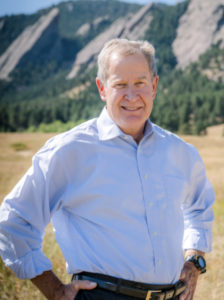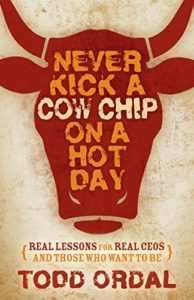Todd Ordal: The New CEO
by Carla Fleming of Pivoting Strategies | original post can be found here.

“A lot of CEOs don’t really understand strategy. They never had to because they go into a business that was successful,” said Todd Ordal.
The CEO role and the internal capabilities required to grow a company are rapidly being redefined. The New CEO is grappling with a:
- Shift from shareholder to stakeholder
- Seismic demographic, ethnic, and gender transference from Baby Boomers to GenXers, Millennials, and GenZers
- Reimagination of physical products to digital products and multiple services
- Recognition that understanding customer behaviors, not transactions are redefining customer relationships,
- Realization that we’re in a Gilded Age where the veneer of everything is great to the Authenticity Age where leaders, consumers, and communities are leveraging social business and corporate social responsibility to solve the challenges we face.
If I had one word to describe Todd Ordal, President of Applied Strategy, it would be Coach. A coach to CEOs for mid-cap companies with revenues in the $50 million to $2 billion range for almost 15 years, he is the former CEO of two medium-size companies: a sporting goods and design wholesale firm and a learning disabilities company. He was also the former Division President of Kinko’s. As Todd notes, he has the scars and the lessons he’s learned along the way that informs how he thinks about the CEO role.
In the conclusion, Part 4 of our series with Todd Ordal, we’ll discuss his book, “Never Kick a Cow Chip on a Hot Day: Real Lessons for Real CEOs and Those Who Want to Be,” The New CEO and the role of the stakeholder versus the shareholder’s role in a business, and what he’s reading. Read Part 1, Part 2, and Part 3.
_____________________________
Carla A. Fleming (Fleming): One of the things I liked in your book, Don’t Kick a Cow Chip on a Hot Day: Real Lessons for Real CEOs Or Those Who Want to Be, is that you talk about the difference between decision-making, problem-solving, and innovation. How did you figure that out?
 Todd Ordal (Ordal): I learned from a guy by the name of Alan Weiss. When I think about my years in operating roles, I wish I knew then some of the things I’ve learned in the last 15 to 20 years. Alan kind of adopted those ideas from a firm he was in way back when it was called Kepner-Tregoe. There is a great book out there called The Rational Manager. It’s old, but brilliant if you can kind of adopt those practices.
Todd Ordal (Ordal): I learned from a guy by the name of Alan Weiss. When I think about my years in operating roles, I wish I knew then some of the things I’ve learned in the last 15 to 20 years. Alan kind of adopted those ideas from a firm he was in way back when it was called Kepner-Tregoe. There is a great book out there called The Rational Manager. It’s old, but brilliant if you can kind of adopt those practices.
But when you go into work every day and open the door, there are problems and fires to fight. And, people with issues and investors you’ve got to talk to. You don’t take the time to slow down to learn some of the processes that would be helpful.
Fleming: I felt like when I read the example, the decision-making about the VP that wasn’t playing nicely, I think I intuitively knew she wasn’t going to work as a team member and would have to go.
Ordal: I’ve been down that line with a number of CEOs that I’ve coached. They would say, I have a problem. Well, I’d ask them to tell me about the problem. “Well, Carl’s misbehaving” and they go on to describe this behavioral problem. I said, you don’t have a problem. You have a decision. You’re just avoiding the decision. Why don’t you make it? So, it’s been helpful.
Fleming: What things could you put in place that will solve the problem? I’m sure you were doing some of that at Kinko’s, in terms of that thought process.
Ordal: If you think about the stores being a multi-unit retail, as you move up the ladder, it’s a constant turnaround activity. You constantly have stores or regions or areas or districts that are screwed up. So, you have to say, why is that? You develop your checklist. Let’s go get my eyeballs on it first.
What does leadership look like? Do we have the right resources for this person? What does the marketplace look like in that area? But more often than not, it came down to the leadership. When you open a new store, the income and education levels in the surrounding area (key success factors for Kinko’s) align with other successful stores. We’ve got a high traffic count, main and main location, egress into the store is fine. We’ve got the same equipment as the other place. Why is this store failing? Well, when you eliminate all the other stuff, you go, it’s the manager.
So, you intuitively go through that. I probably could have been more deliberate about that.
Fleming: Why?
Ordal: I wasn’t smart enough to make the checklist.
Fleming: I thought it was great. Then the difference between problem-solving and innovation because I feel like a lot of companies aren’t thinking about that. In the book, you also talked about the importance of having a communications strategy.
Ordal: We’ll you said something important and interesting. Or at least, I think it was interesting. A lot of CEOs don’t really understand strategy. They never had to because they got into a business that was successful. You get on the train and you make sure the wheels keep rolling. You learn how to fix things without having to reinvent yourself. Until there’s a wall coming at you, you don’t do anything.
That’s oftentimes when it’s too late.
Oftentimes CEOs are not comfortable with innovation. You’ve got to look at their backgrounds and say what had they done in the past and their personality. Are they risk-takers that have been in an environment where they had to innovate? Or, it has been about fighting fires every day – because they’re different people.
Fleming: I think that’s a really good point. One of the other things you talk about in your book is long-term thinking.
Ordal: It kind of goes hand-in-hand with strategy. It’s hard. I’ve made every mistake that every one of my clients made, I’m sure. I was just out traveling for the last couple of days with a client. And, he’s got a bunch of really important, big, tactical problems he’s trying to solve right now. I guarantee you he doesn’t have anything on his calendar for the next six weeks that says think about the long-term.
He’s thinking about the banking relationship. He’s thinking about the senior leader who’s going to leave. He’s thinking about his problems over in Asia. And, they’re all tactical; they’re not strategic. But they’ve got to be dealt with. It’s not easy. It’s easy for us to talk about it because we don’t have to go in and fight all those fires.
Fleming: How do you get your CEOs to start thinking strategically? What’s the tipping point when they have to get to that point?
Ordal: Well, the tipping point is almost always they get into trouble. Almost always, I would say 80% of the time, I think if you asked them.
If I get engaged for a coaching engagement and they don’t want to talk about strategy, it’s not my point to say we need to talk about strategy. I think it comes upright, in some dialogue. You just say “I’m curious, how would you define your market? Or, why do people buy from you versus your competitors? Why are you better than they are? Where do you play? How do you win?”
If they can’t answer the question, I point it out to them and, say, “You couldn’t answer that question. That’s a problem. You may not see it as a problem. I do. But if you don’t, that’s fine. We can move on. But at some point, that will bite you. The clock is ticking, so we can either deal with it or not. It’s up to you.” You can’t coach somebody on something they don’t want to be coached on.
Fleming: How many, what percentage of those folks want to have that strategy conversation that you highlighted?
Ordal: My sample size is small over the years. But I would say unless they’re struggling, if they’re hitting their numbers, and if they’re growing, they don’t want to have the conversation.
I would say 80% of them can’t answer those questions to my satisfaction.
Fleming: I think that’s one of the challenges with companies is that sometimes they have to let go of folks in order to bring on a new set of skills. Sometimes what I see is the CEO will bring in new people, but not necessarily new thinking. It’s kind of a half-dance, or I sort of have one foot in one camp and one foot in the other camp. So, they’re not totally embracing the transition.
Ordal: Yeah, that’s right. We’ll there are some great examples in the HBR (Harvard Business Review) blog on CEO longevity. Pretty much every day in the Wall Street Journal there are examples of what happens when you have a senior leader who surrounds himself with yes people. Not a good idea.
Fleming: What are your thoughts about CEOs in this space where we’ve got more women, CEOs are more ethnically diverse, and they’re older when they start off as entrepreneurs? Whether they realize it or not, they call themselves founders or managing partners. But at the end of the day, they’re still the CEO of their company. What are your thoughts about this explosion? What’s missing with CEOs?
Ordal: I think it puts heightened urgency around developing skills. I mean, if you’re 25 years old and you start a company, you get funding. All of a sudden, you’ve got hundreds of people in this company. Man, you better get on a fast track to leadership capability. Have some advisors around, whether they’re formal or informal who are going to tell you when you’re wrong or right. I mean, you may or may not think Mark Zuckerberg’s a great leader. I don’t know. But, imagine that guy, at that age, having to deal with all the complexity of that large, large business that he created.
You can fault him for many things. I don’t have any inside knowledge of that. But, man, that’s a hard thing to do. Very difficult thing to do. So, I think it puts heightened awareness around self-development for those CEOs who are entrepreneurs.
On the other side of the scale, I guess my take on this is, I know the millennials and younger folks have grown up in a different environment. My children are in their thirties. But, much of what they’re now saying needs to be done to satisfy millennials should have been done 20 years ago. You should always tell people what their job is. You should always give them feedback. You should always create fun in the workplace. You should have always been doing that stuff.
Maybe people just got away without doing it. But, a lot of the things that are now kind of required by the current workforce should have been done a long time ago. I think they can be great in all sorts of roles. They just want meaning. They want purpose and meaning. They want feedback. But they’ll work hard. If you start saying that the key to the new workforce is you have to let them bring their dogs, wear slippers, and play foosball, you are screwed. Great, put that in the basement. But you’re just going to get more those lazy people.
Fleming: The other thing I’m seeing is the ethnic diversity of leadership because sometimes they can’t move up in corporate, so they move out. Or, they move out because of gender.
Ordal: Well, clearly there’s been so much bad behavior in the world and certainly in corporations over the years. I mean, the stuff that went on 20 years ago. It was shameful back then and now there’s just more light on it. I’m glad the stuff’s coming to light. It’s a different environment.
Fleming: What do you think about diversity training because I was talking with a CEO and she’s African-American. She said, “I didn’t know I needed diversity training until I went to diversity training.” That’s when she realized she needed it.
Ordal: Interesting. I don’t have any specific expertise. I think learning to understand differences is terribly important. You’ve got – we all have biases. If you can’t learn to lose some of those, or at least moderate them over time, you’re going to get yourself in trouble. You’re never going to get the benefit of the workforce you have if you have some wacky beliefs. So, getting rid of or minimizing those biases. Learning how to work in a more diverse environment, not just ideas but skin color, and sexual orientation, all that stuff is terribly important.
I think, once again, I would say that probably always should have been terribly important, but it just wasn’t. I mean, you used to walk into a boardroom 20 years ago and it was just all white. A lot of them still are, but no, I think it’s terribly important.
Fleming: One of the things I keep coming back to when I look at this is the Business Roundtable just recently announced the qual status of stakeholders and shareholders. What do you think of them coming to this realization?
Ordal: You may not like my answer. I think they’re wrong. The primary objective of an organization in a capitalist society is not to solve societal problems. It’s to satisfy a customer’s need and to make a reasonable profit, and return it to ownership so that they can do with it as they please. If you say to Jamie Dimon, “Okay, so by the way, I don’t think they said they’re equal, I think they said they’re important,” and I absolutely agree.
Fleming: Okay. So, you think they’re important, but not equal?
Ordal: If you’re treating people like a rented mule, shame on you. I hope you go broke. If you find a way to cheat your customers to make a few extra bucks, shame on you. I hope you go broke.
The best way to run a business is to engage your people, to be honest with them, to be transparent, to pay them a reasonable wage. I’m a big believer in open-book management. I think putting profit-sharing down to the front-line level is a great thing. I love that. It’s just a better way to run a business. To say they’re equal, I think it gets you sideways. Milton Friedman gets misunderstood. That’s where that originally came from.
Fleming: What drives the need to work on culture in a company?
Ordal: It’s usually because the CEO is not happy with what they have. It’s either a new CEO who’s got a dysfunctional culture. Or, it’s a CEO who said, “I didn’t effectively manage this. It got away from me.”
My undergraduate degree is in psychology but I’m a bit skeptical. There’s a lot of psychobabble around culture. I think the culture is the result of what you reward and what you allow.
What gets rewarded in my company and what do I allow to occur in my company? If you want to change your culture, you have to change those two things. Make heroes out of different people and you have to disallow the behavior you don’t want any more. Say, I don’t like my culture, but I allow people to misbehave. Well, then don’t allow it.
People go, “Well how do you define the culture?” There are really two questions you can ask. You can ask a broad swath of people in the company and you’ll understand the culture. First, Who are the heroes around here and why? We go, oh, we want ethical, yada, yada, yada. But, guess what, the guy who’s the assh**** salesman is the hero. Well, guess what you’re about to get. Secondly, Who gets fired around here and why?
You can go, “Well, the people who get fired are the ones who say cross words to the CEO.” Okay, so there’s no transparency. That culture in the company means it’s about money and you can’t speak freely. Good for you. Is that what you want? It’s not that hard to figure out the culture. You can do it in about a half-an-hour.
You talk to 10 people, one-on-one. Go into the CEO’s office and say here’s what your culture is. I don’t care what’s on your wall. That’s not what you have here.
Fleming: I think the way you’re boiling it down is really insightful because it’s about what do you allow, what do you get fired for. But, it’s also about openness. That was one of the things I noticed in your book was just talking about how transparent you are as a company. To allow your employees to kind of say stuff that you don’t want to hear. You don’t want them sexually harassing someone – that’s a fireable offense. You need to be clear about that and demonstrate that. At the same time, I feel like some companies don’t allow for folks to think differently to really open up and say, here’s where I think you’re wrong. If you’re not giving them that room to do that, they’re the ones who are going to leave and find another place to be productive.
Ordal: I agree. Jim Mattis, the former Secretary of Defense, just came out with a new book called “Call Sign Chaos: Learning to Lead.” I’m about three-quarters of the way through it. Brilliant book about leadership. There’s a lot of military stuff in there. If you don’t like military stuff, don’t read it. I have a kid who was a Marine for seven years. So, I kind of understand it through him as well. You would think if there’s ever any organization that wouldn’t allow transparency and people to be critical up the line, it would be the Marines. But that’s not true.
One of the things he admires in leaders is the ability to have open-heart felt conversations about your screwing up. Transparency is an important thing, if done respectfully.
Fleming: And, I feel like that when you read Brene Brown’s book, “Dare to Lead: Brave Work. Tough Conversations. Whole Hearts.” talking about vulnerability, that’s a big part of it too. It’s being vulnerable enough to say here’s what I do well, here’s what I don’t. But, also, getting the person across from you, if you’re the leader, is to get them to own it. To say, yea, I get it. It’s not my thing.
Ordal: Right.
Fleming: What else are you reading?
Ordal: I’m into spy novels. There’s a whole bunch I love. Some are just historical. I just read a really cool one on Kim Philby. He was a spy who defected to the Soviet Union. He was a Soviet Spy double agent. I’ve got a bunch of them here. “A Woman of No Importance” is a true story about a female U.S spy during World War II.
I have a whole bunch of business books. I just read “Trillion Dollar Coach,” which is pretty interesting. A lot of stuff that comes out is really just old rehash of Peter Drucker. Just because there’s a new skin on the book, doesn’t mean there’s any real new ideas.
Can I grab a book from my bookshelf for you?
Fleming: Sure.
Ordal: Ray Dalio, I just read his book “Principles.” This is an old book from grad school Best book I ever read, “Management: Tasks, Responsibilities, Practices” by Peter Drucker. Let’s see what the copyright date on this was. It’s still relevant today, if you ignore some of the language, as it was 1973 when it was published.
That’s good stuff. I am constantly in fear of becoming irrelevant. What do I need to know to be successful with my clients in the next couple of years? So, yeah, I mean I read the Wall Street Journal every day. I read the Economist, those kings of publications as well. I read two to one, fun to business. I usually have one of each on my iPad.
I find that the more broadly I read, the better I feel about life in general. If it’s just all business, I think that’s a mistake. I like biographies of the Founding Fathers for instance or some kind of stuff from them.
Thank you to Todd Ordal for sharing his insights and wisdom about what makes The New CEO.

In “Never Kick a Cow Chip on a Hot Day: Real Lessons for Real CEOs and Those Who Want to Be,” Todd Ordal discusses what he learned when he sat in the CEO role and what executives who want to become CEOs need to learn about themselves, their teams, and their company to be successful.
Carla A. Fleming is CEO and Founder of Pivoting Strategies, a business strategy consulting firm. She works with CEOs of middle-market companies interested in building their internal capabilities for growth. Follow “The New CEO” blog where we interview CEOs and Founders as they evolve their companies for growth.

coaches CEOs to higher levels of success. He is a former CEO and has led teams as large as 7,000 people. Todd is the author of, Never Kick a Cow Chip On A Hot Day: Real Lessons for Real CEOs and Those Who Want To Be (Morgan James Publishing).
Connect with Todd on LinkedIn, Twitter, call 303-527-0417 or email [email protected].
